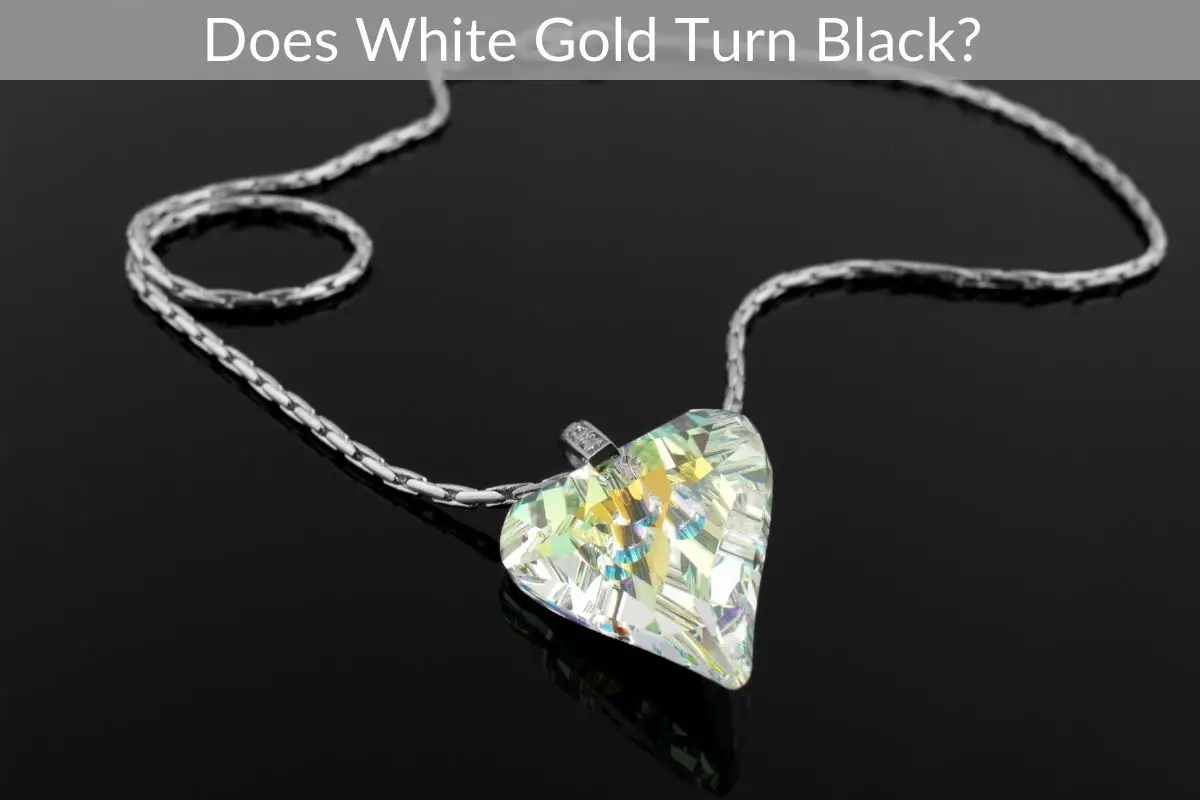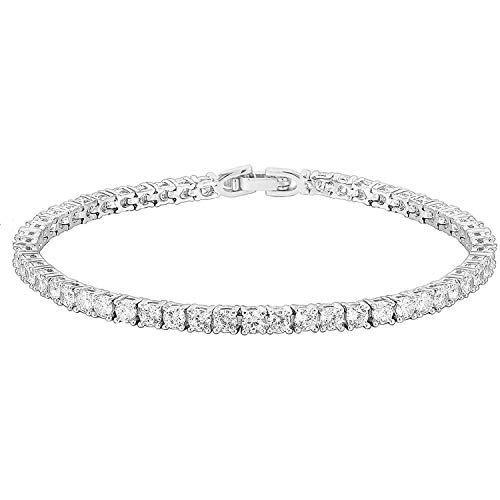Table of Contents
White gold can does not turn black over time. However, white gold can begin to look black due to specific conditions. White gold “fades away” due to the tarnishing of the Rhodium plating on top of white gold.
*This post may contain affiliate links. As an Amazon Associate we earn from qualifying purchases.
However, sometimes when the Rhodium plating fades away, it leads to a layer of black oxidation on the white gold, which you will have to get rid of by polishing. So although white gold doesn’t turn black it can have black oxidation on it when the jewelry needs to be Rhodium plated again.
To see the most popular white gold jewelry just click here.
Can White Gold Turn Skin Black?
Apart from turning black, white gold can also turn your skin black. There may be a couple of reasons behind this color shift. Gold can change color and turn your skin a different color too. But the color is not harmful to you unless you have extremely sensitive skin. The reason for skin turning black around a piece of jewelry are as follows:
Abrasion by Metals
Metallic abrasion is one of the major reasons for discoloration from jewelry. The abrasion could be due to makeup, cosmetics, or even your clothing. Cosmetics have certain chemicals in them and thus can cause abrasion when the metals in the composition are harder than the metals used in jewelry.
The small components can wear off the gold jewelry because of the tiny particles rubbing up against the gold and causing abrasion. The metals can thus look black instead of shiny due to the abrasion caused. This friction between the two metals can lead to the blackening of your white gold jewelry and the skin around it, which collects the blackened particles from makeup or cosmetics.
To be safe from the blackening of your skin, you should look into the kinds of metals present in your makeup and maybe think about investing in different makeup.
Corrosion
The other reason your jewelry might turn a blackish color is corrosion. Corrosion is a natural process in metals. However, gold is not a metal that generally corrodes. Gold is soft and exceptionally pure, so the chances of it corroding are less. However, when considering white gold, we have to understand that the composition of gold there is less.
Additionally, other alloys are intermixed here, like silver and copper, so the corrosion is due to these metals instead. When these metals corrode, they form dark or black compounds and deposit them on the skin, especially in conditions with high moisture.
Corrosion occurs during your skiing when you sweat excessively. Sweating also involves the release of all sorts of fatty acids, which can react with the metal and cause corrosion due to the presence of air and water. Corrosion is most likely to occur if you live in a warm area. If your abode is in a cooler place, you don’t have to worry about sweating routinely. However, this could also signal you to remove your jewelry when you exercise.
Smog fumes can also cause white gold to discolor and turn black. Smog is a mixture of smoke and smog. The reason that it can cause such stubborn discoloration has much to do with the particulate nature of smoke and how tightly it adheres to fog.
The ring’s concave surface underneath the shank is one of the most natural places where the smog accumulates. This is where most of the dirt and other contaminants can gather, and thus this place corrodes with ease. You also run the risk of dermatitis.
To remove all of this gunk, you should try to wash your skin and rings with warm water and soap.
Is White Gold Natural?
White Gold is not natural. There’s no naturally occurring element called white gold. Instead, white gold is an alloy of gold or yellow gold. Gold is natural but white gold is a mixture of gold, silver, and copper, which is why it’s not a natural substance. Jewelers added copper and silver to gold so it could have a white color and result in white gold.
Sometimes, nickel is also added to white gold. However, nickel is an allergen for many people and thus, can cause rashes in many younger people. White gold also has a Rhodium-plating to ensure that it remains white. Some people like referring to unplated white gold as natural gold. However, this is simply not how it works.
When Does White Gold Turn Black?
White gold can turn black pretty easily if you don’t take care of it properly. However, the Rhodium plating can wear off in 1-3 years. If you want to get it replated at this point, you can also do so. However, this is just an estimate. Your white gold can last less or more depending on several factors, such as the thickness of the rhodium plating and its quality.
How Can You Prevent White Gold Turning Black?
You can take measures to ensure that your white gold doesn’t turn black. You can’t ensure that the white gold never turns black, but with great care, you can delay the process of tarnishing. We have listed some of the ways that you can take care of your white gold jewelry below:
- Keep the white gold jewelry separate from all your other metallic jewelry so there’s less risk of discoloration.
- Keep the jewelry away from any harsh acids. You want to ensure that they don’t interact with chemicals like chlorine. So don’t go swimming with the jewelry on.
- Try not to fidget with your jewelry.
- Remove it and keep it away whenever you are cleaning the home.
- Take it for replating after a while
Final Thoughts
The idea of your white gold turning black may make you want to stay away from its purchase altogether. However, there are reasons behind its tarnishing, and for the most part, you can take care of it easily.
This ease of maintenance should make you want to buy the jewelry as it is valuable and looks beautiful when adorned. If you take care of it, you will see that it remains shiny and gorgeous for a long time, thus making it a good investment.



